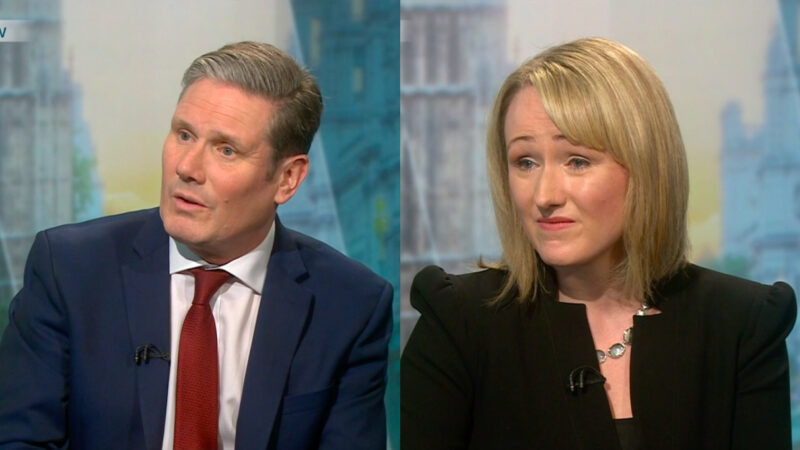
Andrew Neil got the chance to interview the two frontrunners in Labour’s main leadership contest tonight. Both Keir Starmer and Rebecca Long-Bailey waited until now, ten days after ballots started dropping, whereas Lisa Nandy took the risky move of being grilled early back in January, which paid off. Unlike that interview, in which Nandy skilfully avoided blunders and came across as supremely confident, the BBC’s top Rottweiler effectively exposed the key weakness of Starmer and Long-Bailey this evening.
Starmer went first. As always, he very carefully avoided criticising Jeremy Corbyn and repeatedly stressed that he has been “running a very positive campaign” – refusing to be negative about either the outgoing leader or his rivals in the contest. Starmer stayed on message with a focus on party unity, and stuck by his pledges to keep key Labour left policies such as scrapping tuition fees and taking water, rail, mail and energy into public ownership. These commitments may have surprised Neil, whose politics no doubt means he thinks they’re absurd, but they came as no surprise to anyone following the race closely.
Starmer stuck by his decision to quit the shadow cabinet in 2016 and his early declaration for Remain in a second referendum. He did get more uncomfortable when accused of undermining Corbyn on Brexit, calling this “utter nonsense”, and claimed that he only backed Remain after the public vote policy had been adopted by Labour. Starmer also offered a less than convincing answer on his backing for continued freedom of movement. He explained that “there’s a lot of respect people have when you do have a conversation with them” and “getting past the soundbite, do you want immigration, yes/ no” means ‘Red Wall’ voters usually agree with the policy.
The obvious problem with that plan is that being Labour leader doesn’t consist of talking in person to each and every voter Labour needs to win back – certainly Starmer would get very far if he were able to do just that, there is no doubt. Instead, it means facing a media onslaught on a daily basis, having every statement you make reported in bad faith and never having the time to get beyond the uncharitable headline. If elected, he will need a better plan than relying on his face-to-face persuasion skills.
Long-Bailey had a tougher time. She did commit news, as they say, by admitting that she worked on PFI contracts as a solicitor before entering politics. “You couldn’t not work on PFI if you were doing an NHS estate,” she told Neil. Her spokesperson Matt Zarb-Cousin tweeted that this was “perfectly reasonable” , but we know that Owen Smith was rightly scrutinised over his past backing of big pharma in the 2016 race and it is only reasonable for Long-Bailey to be confronted with similar questions now.
It is not so much the detail of the PFI issue that matters in this contest, rather it shows Long-Bailey has not had a long history in the labour movement. This is a blessing and a curse. Corbyn inspired members thanks to his record of fighting the good fight for many decades (and indeed Starmer has similarly used his past to win left credentials in this race), but his lengthy political career also made it easier to attack his record. In an internal election, however, being a ‘Jenny come lately’ to Labour – as Neil put it – has hurt Long-Bailey’s chances by depressing the enthusiasm of the Labour left for her candidacy.
The other news line that came out of Long-Bailey’s interview was that she expressed regret for not calling out the antisemitism of an activist at a recent event. This is not a case of failing to act at some point last year or the awful summer of 2018 – Neil was raising concerns about something that happened last month, when a man spoke to Long-Bailey about “people like Margaret Hodge, John Mann, Tom Watson” being “all members of the Israeli lobby”. She agreed that it was antisemitic, adding: “In my response I thought at the time that I’d been implicit in explaining why this particular gentleman was wrong. But with retrospect I should have called that out directly.”
This exchange won’t please members of the party who think the antisemitism crisis in Labour is overblown, and it won’t satisfy anyone deeply hurt by the handling of antisemitism who wants a marked improvement. And the fact that she said “should have” about an incident as recent as last month is all the more damaging.
The line of questioning by Neil highlighted the key concerns about the two leadership hopefuls. Long-Bailey on PFI contracts showed why many Labour left members have been more enthused by Richard Burgon than her leadership bid, while her answers on antisemitism underscored an important weakness. Starmer revealed a couple of moments of irritation, which must be nipped in the bud – we saw how this only got worse under pressure with Corbyn.
Starmer also failed to say anything newsworthy. This has been a consistent feature of his campaign. That is commendable on the one hand, and his success in avoiding traps set by the media – such as the 10/10 rating question – has been praised by Labour members across the country in nomination meetings. But it presents a challenge for Labour in the coming years. After this election, the cameras will turn away, as Lisa Nandy says. Can he grab public attention when necessary? Is his safety-first approach a permanent fixture, or can he adapt? Holding the Prime Minister to account at the despatch box is essential, but other requirements include a vibrant activist base and a leadership figure with a bit of personality who can appeal to voters in interviews.




More from LabourList
‘The hope that kills you’: Reflections from the final day in Gorton and Denton
MPs, union leaders and organisations react to ‘bruising’ Gorton and Denton result
A gory night for Labour